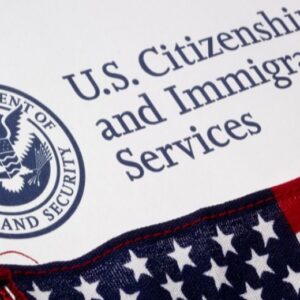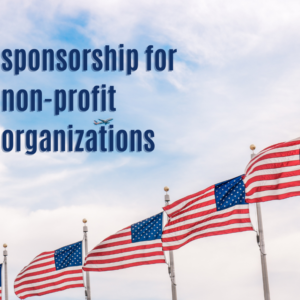USA Visa Sponsorship For Startups; The United States, a land of innovation and opportunity, beckons ambitious entrepreneurs from around the world. If you possess a groundbreaking idea and the drive to turn it into a reality, securing visa sponsorship from a U.S. company can be the key to unlocking the American dream. This comprehensive guide equips you with the knowledge and strategies to navigate the intricacies of the U.S. visa sponsorship process specifically for startups.
Why Consider Visa Sponsorship for Your Startup in the USA?
The U.S. offers a fertile ground for startups to flourish:
- Thriving Ecosystem: The U.S. boasts a dynamic ecosystem for startups, with access to venture capital, mentorship opportunities, and a tech-savvy consumer base.
- Global Recognition: Building your startup in the U.S. grants international recognition and prestige, attracting investors and potential customers worldwide.
- Skilled Talent Pool: The U.S. attracts highly skilled professionals, allowing you to build a strong team to propel your startup forward.
Understanding Visa Sponsorship
Basics of Sponsorship
Visa sponsorship is crucial for startups aiming to hire international talent and expand their operations globally. It involves a company supporting a foreign national’s visa application to work in the United States. The process requires meticulous attention to detail and adherence to immigration laws.
To qualify for visa sponsorship, startups must meet basic requirements such as being a registered business entity in the U.S., having a legitimate job offer for the sponsored individual, and demonstrating financial stability to support the employee. Companies must comply with all legal obligations related to employing foreign workers.
Sponsoring visas comes with responsibilities, including filing necessary paperwork accurately, maintaining compliance with visa regulations, and ensuring the sponsored employee’s well-being. Startups must also be prepared to cover any associated costs, such as visa application fees and legal expenses.
Startup Eligibility
Startups seeking visa sponsorship need to fulfill specific criteria set by immigration authorities. These criteria may include demonstrating that the startup operates a legitimate business, has a physical office or workspace, and can provide evidence of sustainable growth potential. Moreover, startups must showcase their commitment to creating local job opportunities.
The size of a startup can influence its eligibility for visa sponsorship. While there is no strict size requirement, larger startups with an established track record may find it easier to meet the criteria compared to smaller or newer businesses. Immigration authorities often assess the startup’s capacity to contribute meaningfully to the U.S. economy.
Financial stability is paramount for startups pursuing visa sponsorship. Companies must exhibit a healthy financial standing, including sufficient funds to pay the sponsored employee’s salary and benefits in accordance with industry standards. Demonstrating financial viability enhances a startup’s credibility in the eyes of immigration officials.
Key Visa Types
Various visa types cater specifically to startups seeking sponsorship for foreign employees. Common options include the H-1B visa for skilled workers, the L-1 visa for intracompany transfers, and the O-1 visa for individuals with extraordinary abilities in their field. Each visa type has distinct requirements and advantages tailored to different scenarios.
Startups must carefully consider which visa type aligns best with their needs and goals when sponsoring employees. For instance, if a startup aims to bring in top talent from overseas temporarily, the H-1B visa could be suitable due to its focus on specialized skills. On the other hand, the L-1 visa may be ideal for transferring key personnel within multinational organizations.
Understanding the nuances of each visa type is essential for startups navigating the complex landscape of visa sponsorship. By selecting the most appropriate visa category based on their specific circumstances and objectives, startups can streamline the sponsorship process and facilitate seamless integration of international talent into their teams.
Exploring H-1B Visa
Sponsorship Process
To sponsor H-1B visas for startups, companies need to follow a structured process. Firstly, they must submit a Labor Condition Application (LCA) to the Department of Labor. This application ensures that hiring an H-1B employee will not negatively impact local wages or working conditions.
Once the LCA is approved, the employer files Form I-129 with U.S. Citizenship and Immigration Services (USCIS). This form serves as the official petition for the H-1B visa. It includes details about the position, salary offered, and the foreign national’s qualifications.
The timeline for visa sponsorship can vary. After submitting Form I-129, it typically takes several months for USCIS to process the petition. If approved, the employee can start working on October 1st of that fiscal year unless they are already in the U.S. under a different visa status.
Startup Requirements
Startups seeking visa sponsorship must meet specific criteria. They should have a legitimate business entity registered in the United States with a federal tax ID number. Startups need to demonstrate their ability to pay the prevailing wage for the sponsored position.
The structure and business model of a startup play a crucial role in visa sponsorship. Companies with solid financial backing and a clear growth strategy are more likely to succeed in securing H-1B visas for their employees. Investors’ confidence in the startup’s potential growth is also vital.
Demonstrating growth potential is key for startups aiming for visa sponsorship. This involves showcasing scalability, market demand for their product or service, and a sustainable business plan. Startups should emphasize how hiring international talent through H-1B visas contributes to their growth trajectory.
Entrepreneur Visa Options
Overview and Types
Starting a business in the USA as a foreign entrepreneur often requires visa sponsorship. There are various visa options available for startups, each catering to different needs and circumstances. The most common visas suitable for startup founders include the E-2 Treaty Investor Visa, L-1 Intracompany Transferee Visa, and O-1 Extraordinary Ability Visa.
The E-2 Treaty Investor Visa is ideal for entrepreneurs from countries that have a treaty of commerce with the USA. This visa allows individuals to invest in a new or existing business in the USA. However, one limitation is that it does not lead to permanent residency (Green Card).
On the other hand, the L-1 Intracompany Transferee Visa is suitable for startups with an existing foreign office looking to expand into the USA. It allows executives, managers, and employees with specialized knowledge to transfer to a US office. A significant advantage of this visa is its potential pathway to obtaining a Green Card through the EB-1C category.
For exceptionally talented individuals, the O-1 Extraordinary Ability Visa is an option. This visa is designed for individuals who have demonstrated extraordinary ability in their field, such as renowned entrepreneurs or innovators. While it offers flexibility and the possibility of self-sponsorship, meeting the stringent criteria can be challenging.
-
Pros:
-
E-2 Treaty Investor Visa: No minimum investment amount required.
-
L-1 Intracompany Transferee Visa: Pathway to Green Card.
-
O-1 Extraordinary Ability Visa: Flexibility and potential self-sponsorship.
-
-
Cons:
-
E-2 Treaty Investor Visa: No direct path to permanent residency.
-
L-1 Intracompany Transferee Visa: Limited to existing foreign businesses.
-
O-1 Extraordinary Ability Visa: Stringent eligibility criteria.
-
Application Insights
Navigating the visa application process can be complex for startup founders due to specific requirements and documentation needed. To ensure a smooth application process, it’s crucial to thoroughly understand the visa requirements and prepare all necessary documents accurately.
Common pitfalls during the application process include incomplete documentation, insufficient proof of investment or business activity, and lack of clarity in explaining how the startup will benefit the US economy. Avoiding these pitfalls requires meticulous attention to detail and seeking professional guidance when needed.
To increase your chances of a successful visa application as a startup founder, consider engaging with experienced immigration attorneys specializing in business immigration. These professionals can provide valuable insights into preparing a robust application package tailored to your startup’s unique characteristics.
-
Seek professional guidance from immigration attorneys specializing in business immigration.
-
Thoroughly understand visa requirements and prepare all necessary documents accurately.
-
Avoid common pitfalls such as incomplete documentation or insufficient proof of investment.
E2 Visa Essentials
Starting Requirements
To initiate the USA visa sponsorship process for startups, applicants must first ensure they meet the starting requirements. Prepare meticulously by gathering all necessary documents and information before beginning the application. This includes having a solid business plan and financial records ready for submission.
One of the key initial steps is to have a qualified U.S. employer or agent file a petition on the applicant’s behalf. This petition should be submitted to the United States Citizenship and Immigration Services (USCIS). The applicant must also demonstrate that they intend to invest a substantial amount in a U.S.-based enterprise.
When starting the visa sponsorship process, it is crucial to understand the significance of each document required. These may include financial statements, business licenses, lease agreements, and any other relevant paperwork. Thorough preparation at this stage can significantly increase the chances of a successful application.
Investment Criteria
Startups seeking USA visa sponsorship through the E2 visa program must meet specific investment criteria. The investment made by the applicant should be substantial and sufficient to ensure the successful operation of the business. The exact amount required can vary depending on various factors.
The financial thresholds for E2 visa sponsorship are not fixed and can differ based on the nature of the business and its projected impact on the U.S. economy. Applicants must be prepared to invest a significant sum that demonstrates their commitment to developing a successful enterprise in the United States.
The size of the investment plays a crucial role in determining eligibility for visa sponsorship under the E2 program. A larger investment typically indicates a higher level of commitment and potential for success, which can positively influence the approval decision. Startups should carefully assess their financial capabilities before embarking on the visa application process.
EB-5 Visa Breakdown
Investment Thresholds
Startup founders looking for visa sponsorship through the EB-5 program must meet specific investment thresholds. For general projects, the minimum investment amount is $1.8 million. However, if the project is located in a Targeted Employment Area (TEA), the threshold reduces to $900,000.
The financial commitment required for different visa types under the EB-5 program varies significantly. While the standard minimum investment is $1.8 million, investors can benefit from a reduced threshold of $900,000 if their project qualifies for TEA designation. This lower investment requirement aims to encourage job creation in economically disadvantaged areas.
Meeting the investment thresholds not only fulfills legal requirements but also plays a crucial role in enhancing visa sponsorship chances. By demonstrating substantial capital investment in a new commercial enterprise, applicants showcase their commitment to stimulating the U.S. economy and creating employment opportunities.
Job Creation Rules
Understanding the rules and regulations concerning job creation is essential for securing visa sponsorship through the EB-5 program. Investors are required to create at least 10 full-time jobs for qualifying employees within two years of receiving their conditional green card. These jobs must be directly tied to the investor’s enterprise.
Job creation serves as a fundamental factor influencing visa sponsorship approval under the EB-5 program. By successfully generating and maintaining the required number of jobs, investors demonstrate compliance with immigration laws and contribute to economic growth in the United States.
To effectively meet job creation requirements, startup founders should consider strategic approaches such as investing in industries with high job-generating potential or implementing scalable business models that can accommodate rapid workforce expansion. By focusing on sustainable job creation strategies, investors can increase their chances of obtaining visa sponsorship.
L1 Visa Criteria
Transfer Conditions
Startups seeking to transfer visa sponsorships must meet specific criteria set by the L1 visa program. The company must have a qualifying relationship with the entity outside the U.S. where the applicant has been employed. This process involves demonstrating that the startup in the U.S. and the foreign entity are related, such as through ownership or control.
Moreover, transferring visa sponsorships requires showing that both companies will continue to conduct business during the employee’s stay in the U.S. This ensures that the startup remains operational and contributes to the U.S. economy. The transfer process is crucial for startups looking to expand their operations internationally.
Understanding the requirements for transferring sponsorships is essential for startups navigating the complexities of immigration regulations. Startups need to provide detailed documentation supporting the relationship between the U.S.-based entity and its foreign counterpart. Failure to meet these conditions can result in delays or denials of visa sponsorship transfers.
Duration and Limits
The duration of visa sponsorships for startups under the L1 visa program varies based on whether it is an L1A or L1B visa. L1A visas are typically granted for up to seven years, while L1B visas are granted for up to five years. These timeframes allow startups to establish and grow their presence in the U.S.
However, there are limitations and restrictions associated with L1 visas that startups must be aware of. For instance, L1 visas are tied to employment with a specific company, meaning employees cannot switch employers without obtaining a new visa sponsorship. Understanding these limits is crucial for startups planning long-term strategies and staffing decisions.
The duration and limits of visa sponsorships can significantly impact startup growth and stability. Startups must carefully plan their operations within the timeframe allowed by their visas to ensure compliance with immigration laws. Being mindful of these constraints enables startups to make informed decisions about expansion, hiring, and overall business strategy.
EB1C Visa Details
Managerial Eligibility
To qualify for an EB1C visa in the USA, applicants must demonstrate that they hold a managerial position within the company. Managers are individuals responsible for overseeing the operations of the business or a specific department. They should have at least three years of experience in a managerial role. The individual must also be coming to the U.S. to continue working in a managerial capacity.
In startup settings, managers seeking visa sponsorship need to showcase their ability to lead teams and make critical decisions. Qualifications often include a strong educational background, relevant work experience, and proven leadership skills. Startups typically require managers who can adapt quickly to dynamic environments and drive growth initiatives.
Managers play a crucial role in the visa sponsorship process by ensuring compliance with all regulations and requirements. Their responsibilities include overseeing the preparation of necessary documents, coordinating with legal counsel, and providing evidence of the company’s financial standing. Navigating the complexities of visa applications necessitates attention to detail and thorough understanding of immigration laws.
Application Steps
The application process for an EB1C visa involves several key steps that startups must follow diligently. Firstly, companies need to provide evidence of their financial stability and legitimacy as a business entity. Documentation such as tax returns, organizational charts, and business plans are essential for demonstrating viability.
One crucial step is obtaining a Labor Certification, which requires proving that there are no qualified U.S. workers available for the position being sponsored. Companies must then file Form I-140 with supporting documents to petition for the employee’s immigration status.
Streamlining the application process involves effective communication between all parties involved, including legal representatives, HR personnel, and the applicant themselves. Proper documentation management and adherence to deadlines are vital for ensuring a smooth application journey.
To enhance the chances of success, startups should seek guidance from experienced immigration attorneys who specialize in employment-based visas. These professionals can provide valuable insights into navigating the intricate visa process and help companies avoid common pitfalls.
International Entrepreneur Rule
Qualifying Criteria
Startups seeking visa sponsorship under the International Entrepreneur Rule must meet specific criteria. One key requirement is that the startup must have been formed within the past five years. It should demonstrate significant potential for rapid growth and job creation in the United States.
To qualify for visa sponsorship, startups need to show that they have received at least $250,000 in funding from established U.S. investors or at least $100,000 in grants from government entities. Furthermore, they must prove their substantial ownership stake and active role within the company to ensure their eligibility.
Meeting all the qualifying criteria is crucial for successful visa sponsorship. Failure to fulfill any of these requirements can result in the application being denied. Therefore, startups must meticulously review and address each criterion to enhance their chances of approval.
Application Process
The application process for visa sponsorship as a startup involves several stages. Initially, the startup submits Form I-941 along with supporting documents demonstrating their eligibility based on the qualifying criteria mentioned earlier. This includes detailed business plans and financial statements.
Upon submission, startups may be required to attend an interview with USCIS officials to further discuss their business model and growth projections. Following this, background checks are conducted to verify the information provided in the application.
Documentation plays a crucial role in the application process. Startups must ensure that all required paperwork is accurate and up-to-date to avoid delays or potential rejections. Verification steps are stringent, aiming to confirm the legitimacy of the startup’s operations and intentions.
Visa Strategy for Startups
Choosing the Right Visa
When navigating visa options for startup sponsorship, startups need to carefully evaluate various factors. Consider the nature of your business and its growth trajectory. Different visas cater to specific needs, such as the O-1 visa for individuals with extraordinary abilities or the E-2 visa for investors. The right visa choice can significantly impact your startup’s success in obtaining sponsorship.
Understanding how each visa aligns with your startup’s goals is crucial. For instance, the L-1 visa allows intra-company transfers, ideal for established businesses expanding to the U.S. On the other hand, the H-1B visa targets skilled workers in specialty occupations. Each visa category has distinct requirements and benefits that can shape your startup’s journey in the U.S.
The implications of selecting the appropriate visa extend beyond initial sponsorship approval. It affects your ability to scale operations, hire talent, and access resources in the U.S. For example, choosing a visa that restricts hiring can impede your startup’s growth potential. By opting for a visa that aligns with your long-term objectives, you pave the way for sustainable expansion and success.
Planning the Application
Strategic planning plays a pivotal role in securing successful visa sponsorships for startups. Start by outlining a clear timeline detailing key milestones and deadlines throughout the application process. This structured approach ensures that you stay on track and submit all necessary documents promptly.
Effective planning involves thorough research on visa requirements and regulations to avoid any pitfalls during the application process. Familiarize yourself with documentation needs, processing times, and potential challenges you may encounter along the way. By proactively addressing these aspects, you enhance your chances of a smooth application experience.
Creating a comprehensive plan entails collaborating with legal experts specializing in immigration law. Seek guidance on compiling essential paperwork, crafting compelling business plans, and presenting a strong case for startup sponsorship. Legal professionals can offer valuable insights into navigating complex immigration procedures and maximizing your chances of securing the desired visa.
Success Stories
Startup Triumphs
Startups like TechCo and InnoVate have successfully navigated the USA visa sponsorship process, securing visas for their international employees. These success stories highlight the importance of meticulous planning and a strong support network.
TechCo, a software development startup, managed to sponsor visas for their top engineers from India and China, enabling them to work in the United States. This achievement showcases the potential for startups to compete on a global scale by leveraging visa sponsorship.
Similarly, InnoVate, a biotech startup, overcame visa challenges by demonstrating the unique skills their foreign employees brought to the table. By showcasing their contributions to innovation and job creation, they secured necessary visas for their team members.
The triumphs of these startups underscore the significance of visa sponsorship in fostering diversity and talent acquisition within the startup ecosystem. By embracing innovation and adaptability, these companies have set a precedent for others to follow suit.
Lessons Learned
One key lesson learned from successful visa sponsorship endeavors is the value of building strong relationships with immigration authorities. Maintaining open communication channels and adhering to regulations are crucial aspects that startups must prioritize.
Another important aspect is understanding the intricacies of visa categories and requirements. By staying informed about changes in immigration policies and procedures, startups can streamline the sponsorship process and avoid potential delays or setbacks.
Moreover, startups should anticipate challenges such as processing times and documentation complexities when embarking on visa sponsorship initiatives. By proactively addressing these hurdles and seeking expert guidance, companies can enhance their chances of success.
Navigating Challenges
Common Obstacles
Startups often face significant challenges when navigating the visa sponsorship process. One common obstacle is meeting the stringent requirements set by immigration authorities. These requirements can include demonstrating financial stability and proving the necessity of hiring foreign talent.
To overcome these hurdles, startups must meticulously prepare their visa sponsorship applications. This involves gathering all necessary documents, such as financial statements and business plans, to support their case. Startups may need to seek legal counsel to ensure compliance with complex immigration laws.
One effective strategy for mitigating risks in visa sponsorship is to establish strong relationships with experienced immigration attorneys. These professionals can provide valuable guidance on navigating the intricacies of the process and help startups avoid potential pitfalls along the way.
Solutions and Tips
For startups embarking on the journey of visa sponsorship, practical solutions and tips can make a significant difference in their success. One key solution is to conduct thorough research on the specific visa categories available for startup sponsorship. Understanding the nuances of each category can help startups choose the most suitable option for their needs.
Moreover, startups should prioritize timely submission of their visa applications to avoid delays in processing. Missing deadlines or submitting incomplete documentation can hinder the approval process and prolong the wait for visas to be granted.
Expert advice from successful entrepreneurs who have navigated the visa sponsorship process can also provide invaluable insights for startups. By learning from real-world experiences and best practices shared by industry leaders, startups can streamline their own sponsorship efforts and increase their chances of success.
Expert Recommendations
In addition to practical solutions, expert recommendations play a crucial role in guiding startups through the complexities of visa sponsorship. One key recommendation is to maintain open communication with immigration authorities throughout the application process. Clear and transparent communication can help address any issues promptly and prevent misunderstandings that could lead to delays.
Furthermore, startups should prioritize building a strong case for why they require foreign talent to support their growth and innovation goals. Providing compelling reasons backed by data and market analysis can strengthen their chances of securing visa sponsorships successfully.
Summary
In conclusion, exploring the process of USA visa sponsorship for startups illuminates both the opportunities and challenges inherent in navigating the complex landscape of immigration and entrepreneurship. Throughout this examination, we’ve uncovered the various visa options available to startup founders and employees seeking to establish or join innovative ventures in the United States.
From the popular H-1B visa program to specialized categories like the O-1 visa for individuals with extraordinary abilities, the U.S. visa system offers pathways for talented entrepreneurs and professionals to contribute their expertise to the vibrant ecosystem of American startups. Additionally, initiatives such as the International Entrepreneur Parole program provide a framework for foreign entrepreneurs to launch and grow their ventures in the United States, further enriching the nation’s entrepreneurial landscape.
However, securing USA visa sponsorship for startups involves navigating a myriad of legal requirements, documentation processes, and potential hurdles, including stringent eligibility criteria, limited visa quotas, and evolving immigration policies. As such, aspiring startup founders and employees must approach the visa application process with careful planning, diligence, and perhaps professional guidance to optimize their chances of success.
Moreover, beyond the logistical aspects, visa sponsorship for startups underscores broader themes of innovation, talent mobility, and economic competitiveness. By attracting entrepreneurial talent from around the globe, the United States not only fosters diversity and creativity within its startup ecosystem but also harnesses the collective expertise and ingenuity necessary to drive technological advancement, job creation, and economic growth.
As the United States continues to position itself as a global hub for innovation and entrepreneurship, facilitating visa sponsorship for startups remains pivotal in ensuring that the nation remains at the forefront of cutting-edge industries and transformative technologies. By streamlining visa processes, expanding visa categories, and fostering a welcoming environment for foreign entrepreneurs, policymakers and stakeholders can further catalyze the dynamism and resilience of the American startup ecosystem.
In essence, visa sponsorship for startups represents not only a gateway for individuals to pursue their entrepreneurial aspirations in the United States but also a catalyst for fostering innovation, driving economic prosperity, and advancing global collaboration in an increasingly interconnected world. Through strategic investments in talent mobility and supportive policies, the United States can continue to harness the boundless potential of entrepreneurial talent to shape a brighter future for generations to come.
Frequently Asked Questions
How can a startup obtain visa sponsorship in the USA?
To secure visa sponsorship in the USA, startups can explore options like the H-1B visa for skilled workers, E2 visa for investors, or EB-5 visa for entrepreneurs investing significant capital. Each visa type has specific criteria and requirements that must be met for successful sponsorship.
What are the key differences between E2 and EB-5 visas for startup founders?
The E2 visa is designed for investors making a substantial investment in a U.S. business, while the EB-5 visa requires a larger investment that creates jobs in the U.S. The E2 visa does not lead to permanent residency automatically, unlike the EB-5 visa.
Can international entrepreneurs apply for an EB1C visa?
The EB1C visa is tailored for multinational executives or managers transferring to a U.S. company. While international entrepreneurs may qualify if they meet the executive or managerial criteria and have been employed abroad by the same company or its affiliate, it is not specifically designed for startup founders.
What is the International Entrepreneur Rule and how does it benefit startups?
The International Entrepreneur Rule allows eligible foreign entrepreneurs to stay in the U.S. on a parole status to grow their startup. It provides an opportunity for founders who can show significant public benefit through their business venture but does not provide a direct pathway to permanent residency.
What are some common challenges faced by startups navigating the USA visa sponsorship process?
Startups often encounter challenges such as meeting specific eligibility requirements, demonstrating financial viability, understanding complex legal procedures, and competing with limited visa quotas. Navigating these hurdles requires careful planning, expert guidance, and a thorough understanding of the immigration system’s intricacies.




